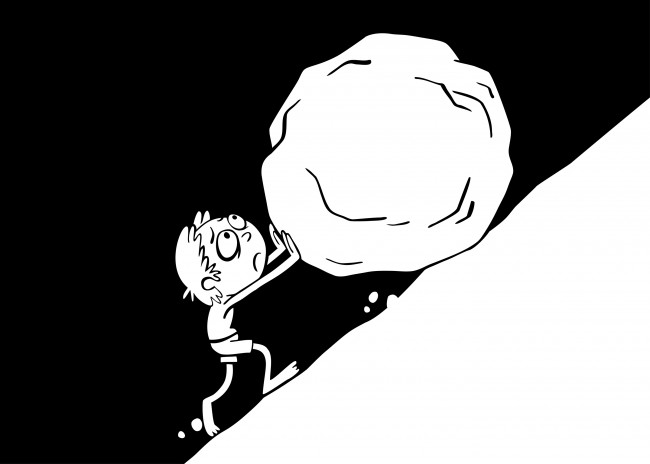I think the general assumption we all make is that change is hard, which is fairly logical. Moving from “A-State” (which probably involves a degree of complacency) to “B-State” (which is new and different) would naturally be a challenge, right?
And that’s just at the individual level.
Organizational change is a whole different racket. Now instead of one individual trying to make changes, you might be changing the reporting structures and workflows of 3,000+ people.
That’s really hard. In fact, it terrifies most people.
The problem with this whole “change is hard” deal, though, is this: it allows people to hide behind it. “Change is hard,” someone can say, “so I won’t do it — well, not now at least.”
Complacency wins 12-round fights over change a lot. And in fact, technology is probably making that worse.
But what if we could shift this narrative and remove the main excuse?
Nick Tasler and the change concept
Here’s a good article on HBR called “Stop Using The Excuse That Organizational Change Is Hard.” I already agree with the title. It’s written by Nick Tasler, who we’ll get back to in one second. In this article, Tasler writes a lot about the whole stat that “50-70% of change management programs fail,” which is apparently unscientific. But he also adds this, which is cool:
Change is hard in the same way that it’s hard to finish a marathon. Yes, it requires significant effort. But the fact that it requires effort doesn’t negate the fact that most people who commit to a change initiative will eventually succeed. This point has gone largely unnoticed by an entire generation of experts and laypeople alike. I am just as guilty of this omission as everyone else. But now that we know the truth, don’t we have a duty to act on it? Isn’t it time to change the way we talk about change?
This is pretty interesting because, honestly, most people I know who have used “marathon” as a goal have hit it, regardless of health going in. 26 miles is a long distance. (So is 13.) So if all these people are able to do that, even once, then why are we saying change is hard? Seems a good amount of people are capable of some change around their habits and training to knock out 13 miles or so.
On Tasler’s own website, he’s got an article called “Changing Your Life Isn’t As Hard As You Think,” (also good title), which includes this:
We confuse the fact that change requires effort with the myth that success is unlikely. The evidence actually suggests that change is hard much in the same way that it’s hard to finish a marathon or learn a new language. Of course it requires effort. But the fact that it requires effort doesn’t negate the fact that the majority of people who commit to it will eventually succeed.
Ding.
So admittedly this is a small sample size…
We’re basically talking about people doing marathons, which is a fairly specific life event, sure. But while I can’t find a good number of first-time marathoners in a given year, I can tell you I personally know hundreds of people who have hit that goal in a given year. I myself have done a half and I wouldn’t classify as “in shape” — although I’m trying to get there.
Running a marathon is legit change. You need to change the structure of your day, how you eat, what you focus on, etc. It may be for only a few months, but you still need to do it, right? And most people that set out to do it usually legit do it. They hit the mark.
So is change really that hard? Or do we just throw up impediments or get lazy/complacent?
I think Tasler nails it in that second pull quote — we confuse a fact (change will require effort) with a myth (success is unlikely).
So what if we began thinking success is likely?
Well, that’s probably easier said than done. Negative thoughts are still pretty normative.
I think many people suffer from a fear of not being good enough, but we don’t often discuss that openly. And in the social media era, we slap a veneer on a lot of stuff, fueling hyper-comparison — which makes people feel worse up to the point of legit isolation.
So viewing a situation as “Success will definitely come!” is pretty hard for most of us, admittedly.
But what if we shifted the narrative on “change is hard?”
What if we said, instead, “This will require some work, but everything worthwhile requires some work, so let’s get to it?”
We’ve all done hard things in life — buried a parent, gotten divorced, trained for a marathon, broken up with a loved one or friend group. All these situations created change. And you know, largely we get through it.
So maybe change isn’t hard?
No, change is still hard
Especially organizational change, yes — that’s uniquely complex.
But if we start thinking slightly differently about change — that it’s inevitable and we’ll get through it — think about how much more we could probably accomplish, individually and collectively.
What’s your take on change? Obviously unique and hard, right? But look at Tasler’s last line in the HBR article:
Every time we feel the impulse to say “change is hard,” we could make a different claim that is every bit as accurate: Adaptation is the rule of human existence, not the exception.
Adaptation is the rule of human existence. Maybe we should think on that a little bit more.

It’s really not – especially if the desired state is move valuable. And people really don’t hate change either. The issue is that people want to own their own change effort instead of having it hoisted onto them.